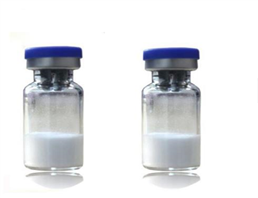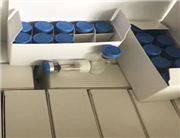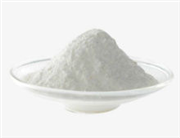Description of GDF-8
Myostatin (also known as growth differentiation factor 8, abbreviated GDF-8) is a myokine, a protein produced and released by myocytes that acts on muscle cells' autocrine function to inhibit myogenesis: muscle cell growth and differentiation. In humans it is encoded by the MSTN gene. Myostatin is a secreted growth differentiation factor that is a member of the TGF beta protein family.
Animals either lacking myostatin or treated with substances that block the activity of myostatin have significantly more muscle mass. Furthermore, individuals who have mutations in both copies of the myostatin gene have significantly more muscle mass and are stronger than normal. Blocking the activity of myostatin may have therapeutic application in treating muscle wasting diseases such as muscular dystrophy.
| Product Name | Top quality GDF-8 |
| Brand Name | SIGMA |
| Packing | 1box/10vials,1mg/vial |
| CAS No | 901758-09-6 |
| Molecular Formula | C221H366N72O67S |
| Application | Pharmaceutical raw materials |
| purity | > 99.0% |
Usage of GDF-8
The gene encoding myostatin was discovered in 1997 by geneticists Se-Jin Lee and Alexandra McPherron who produced a strain of mutant mice that lack the gene. These myostatin "knockout" mice have approximately twice as much muscle as normal mice. These mice were subsequently named "mighty mice".
Naturally occurring deficiencies of myostatin have been identified in cattle by Ravi Kambadur, whippets, and humans; in each case the result is a dramatic increase in muscle mass. A mutation in the 3' UTR of the myostatin gene in Texel sheep creates target sites for the microRNAs miR-1 and miR-206. This is likely to cause the muscular phenotype of this breed of sheep.
Name |
Melanotan 1 |
Melanotan 2 |
CJC 1295 |
cjc1295 dac |
Sermorelin |
PT 141 |
Ipamorelin |
GHRP-6 |
GHRP-2 |
Hexarelin |
Thymosin Beta 4 (TB4) 2mg Model: TB-500 |
Oxytocin 2mg |
epitalon |
selank |
BPC 157 |
Gonadorelin |
Triptorelin GNRH |
ghrh |
Tesamorelin |
Follistatin 344 |
ACE031 |
GDF-8 |


 China
China

